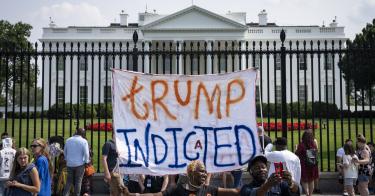The Justice Department unsealed Friday its indictment of former President Donald Trump, currently the leading candidate to face President Joe Biden.
The news elicited strong reactions from members of Congress and others concerned about the politicization of our justice system and the application of double standards in prosecutorial decisions.
Recent revelations from special counsel John Durham’s report and the work of the House Oversight and Accountability Committee and the Select Subcommittee on the Weaponization of Government show that these concerns are more than justified.
The independent judiciary is one strong bulwark against prosecutorial overreach. Under our constitutional system, every defendant is entitled to due process before an impartial judge, a trial by jury, and the presumption of innocence until proven guilty beyond a reasonable doubt.
But are there reform measures and other actions that our elected political leaders can take to put an end to the abuses of the FBI and the weaponized use of the Justice Department’s investigatory and prosecutorial powers?
The answer is a definite yes.
Of course, as the chief executive, the president can and should take strong action to bring the FBI and DOJ under control and ensure equal justice in federal law enforcement, but that’s unlikely to happen under the current administration.
For its part, Congress has the power to enact effective measures, including structural reforms, to rein in a weaponized executive branch.
For example, several significant reform recommendations are laid out in “Mandate for Leadership 2025: The Conservative Promise,” a joint production of The Heritage Foundation and a coalition of more than 60 conservative public interest organizations that are part of Project 2025. (The Daily Signal is the news outlet of The Heritage Foundation.)
These recommendations, outlined in chapter 17 on the Justice Department, include:
- Moving the FBI under the supervision of an assistant attorney general.
- Moving the FBI director’s office into Justice Department headquarters to ensure greater control and oversight.
- Eliminating unnecessary functions of the FBI that can be performed just as well by the Justice Department, such as the general counsel’s function and public relations and legislative affairs.
- Canceling the new headquarters building and downsizing the Washington offices of the FBI, while shifting more staff and resources to the field offices.
- Eliminating the 10-year term for the director.
- Placing more restrictions and oversight on the use of intelligence-gathering authorities.
Congress can also reform DOJ’s Civil Rights Division in similar fashion to refocus and restore its proper functions.
At the same time, Congress has the power of the purse. It can withhold funding from entire departments or bureaus or take more focused action through the appropriations process—such as placing a ban on the use of federal funds for certain types of abusive investigations or prosecutions, like those aimed at suppressing the free exercise of religious beliefs or targeting Americans who express disagreement with the government’s policies or parents who try to assert control over their own children’s education.
And don’t forget about oversight. The committees of Congress have broad power to investigate the actions, decisions, and policies of the attorney general and other officers of the executive branch, including with regard to controversial prosecutions (or decisions not to enforce the law) that may involve improper political motivations or unequal treatment of similar offenders. The House Judiciary Committee is conducting such oversight into the Manhattan district attorney’s unprecedented prosecution of the former president.
Finally, if officers of the executive branch have abused their powers, including for political purposes, or have otherwise failed to uphold their sworn duty to enforce the laws faithfully and in a fair and equal manner, Congress holds the ultimate authority to remove them from office through the impeachment process.
This piece originally appeared in The Daily Signal



